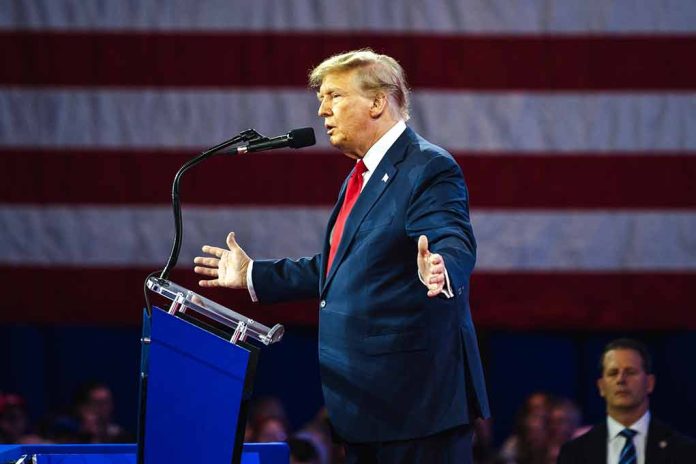
President Trump’s executive order granting Afrikaner South Africans refugee status has sparked international tension and drawn nearly 70,000 applications from those seeking to escape what he called “unjust racial discrimination.”
Key Takeaways
- President Trump issued an executive order offering refugee status to South Africa’s White Afrikaner minority, creating diplomatic tension between the two nations.
- Almost 70,000 South Africans, mostly with Afrikaner or English names and aged 25-45, have registered interest in relocating to the United States.
- The refugee offer has emboldened secessionist movements like the Orania settlement and the Cape Independence Advocacy Group, which are seeking U.S. support.
- South African President Cyril Ramaphosa opposes these movements, stating they don’t represent the majority’s desire for unity.
- The situation escalated after Ramaphosa signed legislation allowing land expropriation without compensation in certain circumstances.
Trump’s Executive Order Triggers Diplomatic Crisis
President Donald Trump signed an executive order designating White Afrikaners in South Africa as eligible for refugee status in the United States. The order described Afrikaners as “victims of unjust racial discrimination,” a characterization that has infuriated South African officials. The U.S. Embassy in Pretoria confirmed they have received applications from tens of thousands of interested South Africans, with the South African Chamber of Commerce in the USA (Saccusa) reporting they’ve forwarded a list of over 67,000 registrants to embassy officials. Most applicants are between 25-45 years old with two to three dependents.
The diplomatic fallout has been severe. Relations between the U.S. and South Africa, already strained during Trump’s administration, deteriorated further when Trump cut aid to South Africa and the U.S. expelled South Africa’s ambassador. Secretary of State Marco Rubio reportedly labeled the ambassador a “race-baiting politician.” The Trump administration has established “Mission South Africa” to facilitate Afrikaner resettlement in the United States, with embassy officials in Pretoria already scheduling interviews with potential refugees.
How could we be expected to go to South Africa for the very important G20 Meeting when Land Confiscation and Genocide is the primary topic of conversation? They are taking the land of white Farmers, and then killing them and their families. The Media refuses to report on this.… pic.twitter.com/GXiVOI5vZD
— Donald J. Trump Posts From His Truth Social (@TrumpDailyPosts) April 12, 2025
Land Reform and Historical Context
The current tensions are rooted in South Africa’s ongoing land reform efforts. President Cyril Ramaphosa recently signed legislation enabling land expropriation without compensation when deemed in the public interest. This move alarmed many White South Africans, who still own most privately held land despite apartheid ending over 30 years ago. Trump has made controversial claims about the situation, “they are taking the land of white Farmers, and then killing them and their families,” said Trump.
Ramaphosa has emphasized that no land has been forcibly seized and that the legislation aims to address historical inequities in land ownership dating back to apartheid. Nevertheless, concerns about future implementation of the law have prompted thousands of White South Africans to explore emigration options. The U.S. Embassy memo indicates plans to “propose long-term solutions, to ensure the successful implementation of the president’s vision for the dignified resettlement of eligible Afrikaner applicants.”
Secessionist Movements Gain Momentum
Trump’s refugee offer has energized South African secessionist movements. The Orania Movement, which operates an enclave in Northern Cape Province, sees Trump’s actions as implicit support for their autonomy goals. Joost Strydom, leader of Orania, has appealed directly to Trump with the message “Help us Here,” requesting U.S. recognition of the settlement as autonomous rather than assistance with relocation. Orania has developed its own infrastructure and successful agricultural projects, presenting itself as a model for Afrikaner self-determination.
Similarly, the Cape Independence Advocacy Group has intensified lobbying efforts in Washington, seeking support for a referendum on Western Cape province secession. South African government spokesman Vincent Magwenya has strongly condemned these movements, insisting they represent fringe interests rather than mainstream South African opinion. Fikile Mbalula of the African National Congress called it “madness to build refugee centers in a peaceful country like South Africa,” emphasizing that the nation doesn’t face the violent conflicts typically associated with refugee crises.
Impact on South African Society
The refugee offer has reignited racial tensions within South Africa, a country that former President Nelson Mandela once described as a “rainbow nation.” Many Black South Africans view the refugee offer as undermining the nation’s post-apartheid reconciliation efforts and perpetuating false narratives about their country. Meanwhile, some White South Africans who have no interest in leaving have publicly rejected Trump’s characterization of their situation, emphasizing their commitment to building a united South Africa despite political challenges.
President Ramaphosa has called for calm and unity, stating that secessionist movements fail to represent the majority’s desires for a unified nation. As the U.S. Embassy processes applications and tensions continue to simmer, both governments face pressure to find diplomatic solutions that address legitimate concerns without further inflaming racial division. The situation remains fluid, with significant implications for U.S.-South African relations and the future stability of South Africa’s multiracial democracy.
Sources:
South Africa reels over Trump’s offer of refugee status to white Afrikaners
Almost 70,000 South Africans interested in US asylum
‘Mission South Africa’: How Trump Is Offering White Afrikaners Refugee Status







